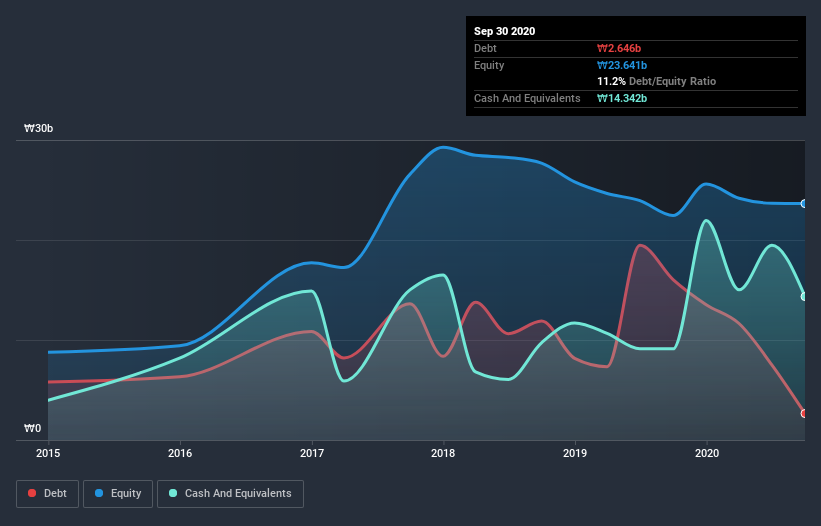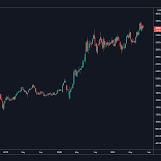- South Korea
- /
- Software
- /
- KOSDAQ:A263800
Is Datasolution (KOSDAQ:263800) Using Debt In A Risky Way?
The external fund manager backed by Berkshire Hathaway's Charlie Munger, Li Lu, makes no bones about it when he says 'The biggest investment risk is not the volatility of prices, but whether you will suffer a permanent loss of capital.' When we think about how risky a company is, we always like to look at its use of debt, since debt overload can lead to ruin. We note that Datasolution, Inc. (KOSDAQ:263800) does have debt on its balance sheet. But the more important question is: how much risk is that debt creating?
What Risk Does Debt Bring?
Generally speaking, debt only becomes a real problem when a company can't easily pay it off, either by raising capital or with its own cash flow. Part and parcel of capitalism is the process of 'creative destruction' where failed businesses are mercilessly liquidated by their bankers. While that is not too common, we often do see indebted companies permanently diluting shareholders because lenders force them to raise capital at a distressed price. Having said that, the most common situation is where a company manages its debt reasonably well - and to its own advantage. When we examine debt levels, we first consider both cash and debt levels, together.
View our latest analysis for Datasolution
What Is Datasolution's Debt?
You can click the graphic below for the historical numbers, but it shows that Datasolution had ₩2.65b of debt in September 2020, down from ₩16.0b, one year before. But it also has ₩14.3b in cash to offset that, meaning it has ₩11.7b net cash.

How Healthy Is Datasolution's Balance Sheet?
The latest balance sheet data shows that Datasolution had liabilities of ₩18.2b due within a year, and liabilities of ₩1.18b falling due after that. Offsetting these obligations, it had cash of ₩14.3b as well as receivables valued at ₩5.64b due within 12 months. So it actually has ₩595.2m more liquid assets than total liabilities.
Having regard to Datasolution's size, it seems that its liquid assets are well balanced with its total liabilities. So while it's hard to imagine that the ₩114.3b company is struggling for cash, we still think it's worth monitoring its balance sheet. Simply put, the fact that Datasolution has more cash than debt is arguably a good indication that it can manage its debt safely. There's no doubt that we learn most about debt from the balance sheet. But you can't view debt in total isolation; since Datasolution will need earnings to service that debt. So when considering debt, it's definitely worth looking at the earnings trend. Click here for an interactive snapshot.
In the last year Datasolution had a loss before interest and tax, and actually shrunk its revenue by 26%, to ₩80b. That makes us nervous, to say the least.
So How Risky Is Datasolution?
While Datasolution lost money on an earnings before interest and tax (EBIT) level, it actually booked a paper profit of ₩119m. So when you consider it has net cash, along with the statutory profit, the stock probably isn't as risky as it might seem, at least in the short term. With mediocre revenue growth in the last year, we're don't find the investment opportunity particularly compelling. When analysing debt levels, the balance sheet is the obvious place to start. However, not all investment risk resides within the balance sheet - far from it. To that end, you should be aware of the 1 warning sign we've spotted with Datasolution .
At the end of the day, it's often better to focus on companies that are free from net debt. You can access our special list of such companies (all with a track record of profit growth). It's free.
When trading Datasolution or any other investment, use the platform considered by many to be the Professional's Gateway to the Worlds Market, Interactive Brokers. You get the lowest-cost* trading on stocks, options, futures, forex, bonds and funds worldwide from a single integrated account. Promoted
New: Manage All Your Stock Portfolios in One Place
We've created the ultimate portfolio companion for stock investors, and it's free.
• Connect an unlimited number of Portfolios and see your total in one currency
• Be alerted to new Warning Signs or Risks via email or mobile
• Track the Fair Value of your stocks
This article by Simply Wall St is general in nature. It does not constitute a recommendation to buy or sell any stock, and does not take account of your objectives, or your financial situation. We aim to bring you long-term focused analysis driven by fundamental data. Note that our analysis may not factor in the latest price-sensitive company announcements or qualitative material. Simply Wall St has no position in any stocks mentioned.
*Interactive Brokers Rated Lowest Cost Broker by StockBrokers.com Annual Online Review 2020
Have feedback on this article? Concerned about the content? Get in touch with us directly. Alternatively, email editorial-team (at) simplywallst.com.
About KOSDAQ:A263800
Excellent balance sheet and good value.
Market Insights
Weekly Picks


The Future of Social Sharing Is Private and People Are Ready


EU#3 - From Philips Management Buyout to Europe’s Biggest Company

Booking Holdings: Why Ground-Level Travel Trends Still Favor the Platform Giants


A fully integrated LNG business seems to be ignored by the market.
Recently Updated Narratives


The Oncology Anchor: Why Merck’s 46% Discount Defies the Keytruda Cliff


The Architect of Sovereignty: Palantir’s Premium Paradox at $149


BYLOT: Re-Rating Potential Tempered by UK Tax Drag and Speculative-Grade Debt Dynamics – Neutral (Hold)
Popular Narratives

Undervalued Key Player in Magnets/Rare Earth


NVDA: Expanding AI Demand Will Drive Major Data Center Investments Through 2026


The "Easy Money" Is Gone: Why Alphabet Is Now a "Show Me" Story
Trending Discussion





